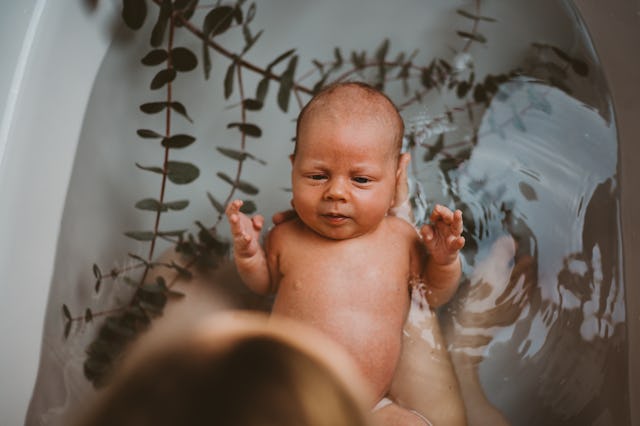Freebirthing Has Gone Viral, But One Expert Says It’s Rife With Risks
Labor and delivery nurse Liesel Teen addresses the concerns surrounding this alternative birthing option, which has gained national attention following the viral story of a woman giving birth in the ocean.

Giving birth is an intensely personal experience, and every pregnant person deserves the ability to feel as safe and empowered during the process as they possibly can. But when one woman went viral recently for giving birth in the ocean, plenty of people began questioning the safety of freebirthing — aka unassisted birth without the support of an obstetrician, midwife, or another trained health professional present during delivery, as Liesel Teen, BSN, RN, a labor and delivery nurse and the founder of Mommy Labor Nurse, tells Scary Mommy.
Josy Peukert welcomed her son back in February but found viral fame in June, reportedly telling a news outlet she did so "because the conditions were right on the day," monitoring tide conditions for weeks prior to her delivery. She gave birth in the water with just her husband nearby, reportedly noting afterward, "I had no fears or worries to welcome a new little soul into our lives, just me, my partner, and the waves. It was beautiful."
While expecting parents should generally make decisions and birth plans that best suit their individual preferences and needs, free birth or freebirthing is rife with potential problems big and small. In fact, it could put the safety and well-being of both mom and baby at serious risk should something go wrong. Despite that, Teen notes a marked increase in interest about alternative birth options, including home births, birthing center deliveries, and, yes, freebirthing.
So, is freebirthing dangerous?
Teen notes that freebirthing is an intentional choice to give birth without a medical professional in attendance, as opposed to a person who accidentally gives birth at home or in the car due to a very quick labor. The TL;DR is… there aren't any circumstances under which it's a safe practice.
"Birth is unpredictable," says Teen, "and even women who are considered low-risk leading up to birth can have life-threatening complications arise during labor that would require medical assistance. Such complications may include shoulder dystocia, postpartum hemorrhage (aka heavy postpartum bleeding, the leading cause of maternal mortality), failure to transition, umbilical cord complications, meconium aspiration (when a newborn's poop gets into its lungs in utero), and fetal intolerance of labor," which can happen due to a newborn's lack of oxygen during delivery.
"If these complications are not quickly identified and treated with proper intervention, the risk of neonatal or maternal mortality can become imminent," says Teen.
Why are non-traditional hospital births on the rise?
There are plenty of reasons why someone might opt out of a traditional hospital birth, explains Teen. Expecting parents might "want to give birth in a setting that is more comfortable and home-like. They want to labor and give birth in whatever position they choose. They don't want to be limited by monitoring devices. They want more freedom in their birth experience. These wishes often lead people into looking into alternative routes to giving birth."
Women's healthcare in the U.S. is meager at best, with the state of maternal healthcare even worse, especially among Black and Indigenous women, who face disproportionately higher maternal mortality rates than their white counterparts. Teen notes the "staggering statistics surrounding the Black maternal morbidity rate" as just one reason why expecting parents might seek alternative options.
"Birth is becoming more medicalized: high C-section rates, lack of autonomy at the bedside (i.e., telling women they can't get up out of bed, limiting labor and pushing positions, not including women in the plan of care, etc.), increase in inductions for non-medical reasons" — all factors that might influence someone's decision to distrust traditional healthcare settings, says Teen. Other factors might include a traumatic past hospital birthing experience, COVID-19 safety restrictions, and increased anxiety in general.
What are some safe alternative birthing options?
Teen says there are two primary options for giving birth outside of the hospital: in a birthing center and at home. "I only recommend these two options if you have a low-risk pregnancy and a Certified Nurse Midwife or a Certified Professional Midwife are involved in your prenatal care, labor, and delivery. In a planned home birth, midwives are equipped to step in should any unexpected complications arise, and they are well versed and trained to advise for a hospital transfer before the situation is dire."
If you're curious about exploring these options, Teen has got you covered. "If you are newly pregnant and have not established care with a provider yet, I would encourage you first to do some research on what providers are available in your area. Once you find two or three that you like, feel free to set up an appointment to meet them and ask some initial questions. Asking family, friends, and/or coworkers for a recommendation can be a great place to start. You can also ask for recommendations in your local moms' group on Facebook."
For those who have already established care with a provider, Teen recommends having a conversation with them about your birth options. "Express your wishes and desires to see whether they align with your provider's," she suggests. "If they don't, you can explore transferring care to a provider who does more closely align with what you were envisioning."
No matter which route you choose, doing your research on those who will be by your side is absolutely crucial. "In the U.S., there are several different ways to become a midwife, several of which do not require any schooling," cautions Teen. "It is imperative that you make sure that the midwife you choose went through formal schooling and is licensed to practice."
Expert Source:
Liesel Teen, BSN, RN, a labor and delivery nurse and the founder of Mommy Labor Nurse